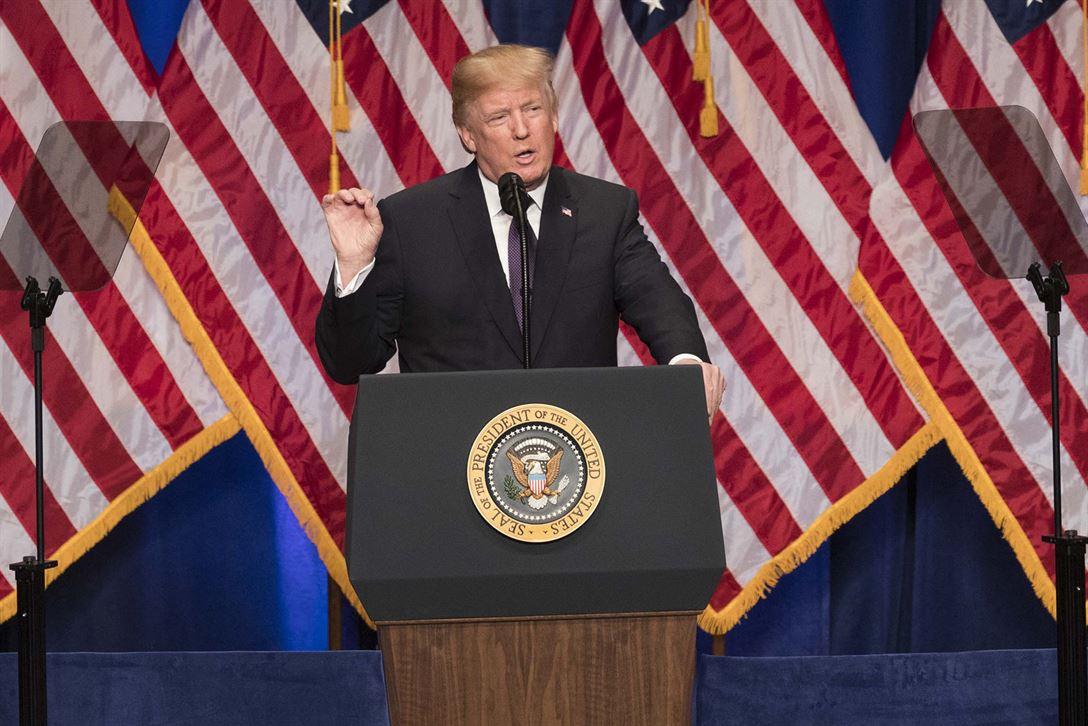Leading to (no)where? Trump’s national security strategy
Posted By Benjamin Schreer on December 20, 2017 @ 14:30

With great fanfare, US President Donald Trump released his government’s first national security strategy [1]. As expected, it continues his theme of ‘America first’ and the need to restore US power and global leadership. It’s also markedly different from President Barack Obama’s 2015 version [2], which stressed multilateralism as the preferred way of addressing major political, economic, security and environmental challenges.
Instead, America’s security strategy is now to be based on ‘principled realism’ and the notion that the US is in a continuous competition with both adversaries and partners. However, while there are some positives, the 2017 strategy ultimately fails to provide a coherent blueprint for restoring US leadership credentials, including in the Asia–Pacific.
To start with, because of Trump’s erratic and impulsive character, the contradictions in the strategy are even more pronounced. As Max Boot points out [3], the document ‘reveals an administration in conflict between the isolationist impulses of the president and the more traditional, internationalist beliefs of his senior aides’. There’s Trump’s deep-seated resentment of what he sees as illiberal trade practices by foes and friends alike. There’s his lamenting about ‘unfair burden-sharing with our allies’, and his launch speech [4] reiterated his belief that ‘countries [that is, allies] that are immensely wealthy should reimburse the United States for the cost of defending them’. But there’s also the commitment to remain engaged strategically in the ‘Indo-Pacific’ and elsewhere, to ‘lead again on the world stage’, and to push back against ‘revisionist China and Russia’.
In principle, the last point is welcome news for Australia and the rest of the region. Indeed, the most refreshing part of the strategy is its discussion of China’s rise and the need for the US to ‘marshal the will and capabilities to compete and prevent unfavourable shifts in the Indo Pacific’. Recognising that efforts to socialise China into becoming a responsible stakeholder in the international system, it calls out Beijing’s challenge:
China is using economic inducements and penalties, influence operations, and implied military threats to persuade other states to heed its political and security agenda … China presents its ambitions as mutually beneficial, but Chinese dominance risks diminishing the sovereignty of many states in the Indo-Pacific. States throughout the region are calling for sustained US leadership in a collective response that upholds a regional order respectful of sovereignty and independence.
The strategy also vows to ‘redouble [America’s] commitment to established alliances and partnerships’, including with Australia. It also explicitly seeks to ‘increase quadrilateral cooperation with Japan, Australia and India’.
So far, so good. Unfortunately, however, the document is less innovative on what exactly to do about China’s challenge to the rules-based order and American primacy. Indeed, its prescribed actions sound almost identical to Obama’s ‘rebalance’, a term the Trump administration deliberately axed once in office: strengthening alliances; deepening new relationships; a commitment to freedom of the seas and the peaceful solution of territorial and maritime conflicts; and a strong forward military presence. But more of the same is unlikely to restore allies’ confidence in America’s ability to check China’s growing power. For instance, the strategy has hardly anything to say about fixing Trump’s lacklustre approach to Southeast Asia other than helping countries to address the ‘growing terrorist threat’. For most of those nations, China is a much bigger issue.
Most problematic, however, is that the strategy fails to deliver key ingredients of US leadership. The first has to do with values, or US ‘soft power’. The document ‘celebrates America’s influence in the world as a positive force’ and declares that the US will ‘lead by example’. Yet, under Trump, America’s global standing and influence have been in freefall [5] and the document doesn’t provide any convincing formula for turning that around. For instance, when it speaks of international cooperation, it emphasises protecting ‘American sovereignty’, doesn’t mention the United Nations once, and stresses that the US will prioritise ‘its efforts in those organizations that serve American interests’. That’s hardly a winning design for global ‘leadership’—witness the recent UN Security Council Resolution [6] on the status of Jerusalem (debated on the same day as the strategy’s launch) in which the US was outnumbered 14 to 1. Moreover, while Obama cited climate change as a ‘top strategic risk’, Trump’s strategy doesn’t even mention this serious global security problem. Instead, it talks at length about ‘energy dominance’ in a way that signals more environmental degradation. It’s unclear how and where the US intends to lead.
Finally, on the economic front, the strategy’s main thrust is to ‘insist upon unfair and reciprocal economic relationships to address trade imbalances’. The launch address also celebrated America’s withdrawal from ‘job-killing deals such as the Trans-Pacific Partnership’—a major strategic blunder [7] that’s undermining US leadership in Asia. The strategy’s emphasis on pursuing ‘bilateral trade agreements on a fair and reciprocal basis’ is short-sighted and fails to recognise that America will likely further lose economic and strategic ground in the region [8].
Article printed from The Strategist: https://aspistrategist.ru
URL to article: /leading-nowhere-trumps-national-security-strategy/
URLs in this post:
[1] national security strategy: https://www.whitehouse.gov/wp-content/uploads/2017/12/NSS-Final-12-18-2017-0905.pdf
[2] President Barack Obama’s 2015 version: http://nssarchive.us/wp-content/uploads/2015/02/2015.pdf
[3] Max Boot points out: https://www.cfr.org/expert-brief/trump-security-strategy-study-contrasts
[4] launch speech: https://www.whitehouse.gov/briefings-statements/remarks-president-trump-administrations-national-security-strategy/
[5] under Trump, America’s global standing and influence have been in freefall: https://www.aspistrategist.ru/opinion/american-power-where-art-thou
[6] UN Security Council Resolution: https://www.theguardian.com/world/2017/dec/18/us-outnumbered-14-to-1-as-it-vetoes-un-vote-on-status-of-jerusalem
[7] a major strategic blunder: http://foreignpolicy.com/2017/06/22/trumps-five-mistaken-reasons-for-withdrawing-from-the-trans-pacific-partnership-china-trade-economics/
[8] America will likely further lose economic and strategic ground in the region: https://www.brookings.edu/blog/order-from-chaos/2017/11/15/the-fallout-from-trumps-asia-tour-on-trade/
Click here to print.